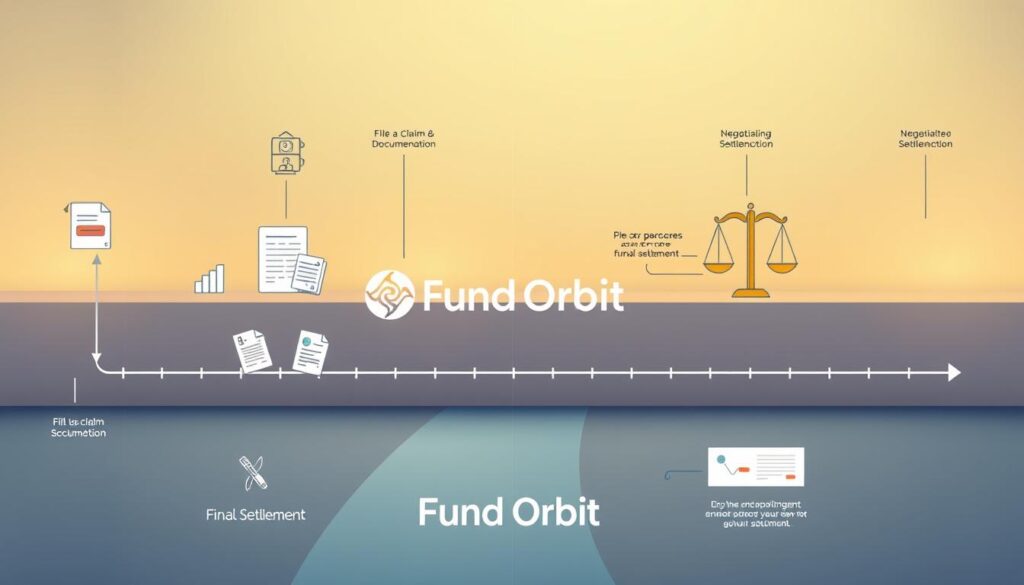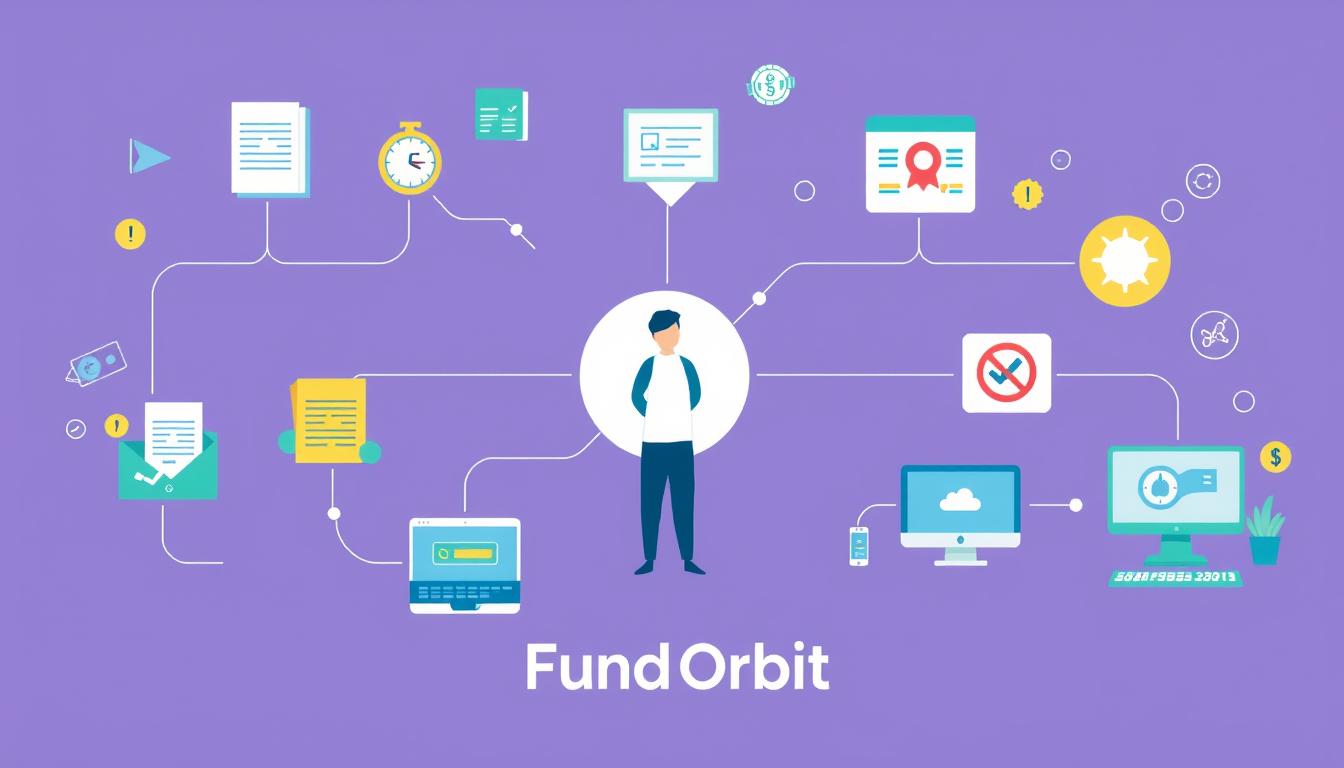Understanding the claims process can be tough, even for those who have done it before. It’s about filing insurance claims to get money back for damages or losses. The National Association of Insurance Commissioners (NAIC) says it’s key to get the money owed after a disaster. This is true for life, auto, and health insurance, which help people bounce back from unexpected events.
Knowing what to expect in the claims process is vital. This includes how to file a claim, what documents you need, and how to negotiate a fair settlement. We’ll give you an overview of the claims process. We’ll also share tips to help you avoid common mistakes. By understanding the process and being ready, you can make sure you get the compensation you deserve.
Key Takeaways
- Understanding the claims process is key to getting compensation for damages or losses.
- Life, auto, and health insurance help people recover from unexpected events.
- Good documentation and preparation can avoid common problems and delays in the claims process.
- Quickly reporting claims can increase the chance of getting full payout benefits by 50%.
- Getting help from public adjusters can raise settlement amounts by 20-25% compared to doing it alone.
- Up to 25% of claims are denied because people don’t know their policy well, including coverage limits and exclusions.
Understanding the Claims Process
Filing a claim can feel overwhelming, even if it’s your first time. The process includes steps like reporting the loss and inspecting the damage. A claims adjuster helps by gathering information to support your claim.
The aim is to get a fair and quick claims resolution. This means checking the damage and figuring out how much to pay. The NAIC says a claim is when someone asks for money because of a loss. Knowing the steps can make the process easier.
- Reporting the loss to the insurance company
- Inspecting the damage and determining the amount of compensation
- Working with a claims adjuster to gather information and evidence
- Receiving a report from the adjuster and reviewing the compensation amount
Understanding the claims process and having a good claims adjuster can lead to a fair outcome. Good claims management is key to success.
Types of Claims You Might Encounter
We often face different types of claims in our daily lives. Knowing these can make the claims handling process easier. The claims procedure can be complex, but knowing the types of claims helps. When dealing with insurance claims, there are several types you might see.
Some common types of claims include:
- Insurance claims, which are requests for payment or compensation for a loss or damage covered by an insurance policy.
- Property damage claims, which are requests for payment or compensation for damage to property, such as a home or business.
- Personal injury claims, which are requests for payment or compensation for injuries or illnesses caused by the negligence or wrongdoing of another person or entity.
It’s key to understand the claims procedure and the different types of claims. This way, we can handle the claims handling process better. Knowing the various types of insurance claims helps us prepare for any claims we might face.

| Type of Claim | Description |
|---|---|
| Insurance Claims | Requests for payment or compensation for a loss or damage covered by an insurance policy. |
| Property Damage Claims | Requests for payment or compensation for damage to property, such as a home or business. |
| Personal Injury Claims | Requests for payment or compensation for injuries or illnesses caused by the negligence or wrongdoing of another person or entity. |
Preparing to File a Claim
When you’re ready to file a claim, having the right documents is key. These documents help prove your claim and make the process smoother. A claims adjuster will look over these to figure out if your claim is valid and how much you should get.
You’ll need things like police reports, medical records, and receipts for any costs related to the issue. Keeping track of all talks with the insurance company is also important. This includes dates, times, and who you spoke with. This info helps move the claims process along and ensures you get what you’re owed.

It’s also vital to know what a claims adjuster does. They help gather info and evidence for your claim. They also talk to the insurance company to find a fair settlement. By working well with your adjuster and providing all the needed documents, you can get a good outcome and a positive experience.
Submitting Your Claim
When you submit a claim, it’s key to follow the right steps. This makes the process smoother. We know it can feel overwhelming, but with the right help, you can steer clear of mistakes. The claims process has several stages, from reporting a loss to getting it resolved.
According to the NAIC, you need to follow the right steps and avoid common errors when submitting a claim. First, check your insurance policy to see what’s covered and what’s not. Then, collect all the documents and evidence you have for your claim. This might include a list of damaged items, photos, or videos.
An adjuster will start investigating your claim to figure out what’s covered. They might ask for info from witnesses or others involved. It’s important to keep good records and give all the info they need to avoid delays.

The review stage is when they check what your policy covers and tell you about any deductibles. They might use experts like appraisers or engineers to assess the damage. After repairs, the adjuster will talk to you about settling your claim and payment.
Common Mistakes to Avoid
- Not providing enough documentation
- Not keeping detailed records
- Not following the proper claims procedure
By knowing the claims process and avoiding common mistakes, you can have a successful claim experience. Always stay informed and follow the right steps to get the most from your insurance policy.
| Claim Stage | Description |
|---|---|
| Reporting a Loss | Notify your insurance company of the loss or damage |
| Claim Investigation | Adjuster investigates the claim to determine the amount of loss or damages |
| Settlement | Adjuster contacts you regarding the settlement of your claim and payment |
Understanding Claim Denials
Understanding claim denials is key in claims management. A claims adjuster helps policyholders through the claims process. But, it’s important to know why claims get denied. The NAIC says denials often happen because of lack of coverage or not enough proof.
Claims can be denied for many reasons. These include policy exclusions, late reporting, and claims that are not true. About 50% of claims are first denied, but can be approved later. It’s vital to read the denial letter and figure out what to do next. This might mean providing more information or evidence.
A claims adjuster can help with the claims process. But, policyholders should also know their rights and options. This includes knowing how to appeal and the importance of timely claims submission. By working with a claims adjuster and understanding the process, policyholders can improve their chances of a successful claim.

- Average annual loss from unresolved claims denials for hospitals: $5 million
- Claims denials represent up to 5 percent of net patient revenue for hospitals
- Denial rates for hospitals have increased by more than 20 percent in the past five years
By understanding why claims are denied and the claims process, policyholders can better handle the system. This increases their chances of a successful claim outcome.
| Claim Denial Category | Percentage |
|---|---|
| Contractual obligations (CO) | 20% |
| Other adjustments (OA) | 15% |
| Payer-initiated reductions (PI) | 10% |
The Settlement Process Explained
The settlement process can be complex and overwhelming. A claims settlement is when the individual and the insurance company agree on a claim resolution. The NAIC says this agreement usually comes from negotiation. It’s important for the individual to work with the insurance company to find a fair settlement.
Being ready to negotiate and compromise is key. A claims adjuster can help a lot in this process.
Negotiation is very important in the settlement process. It’s vital to understand the claims resolution process well. This way, you can negotiate effectively. Some cases have led to big settlements, like $1,171,438 for a fall down stairs incident and $750,000 for unspecified personal injury.
Policyholders who get an insurance advisor are 40% more likely to get a good settlement. This is compared to those who don’t.
Here are some key statistics about the settlement process:
- 75% of claims are settled within 30 days
- Claims with complete documentation are settled about 50% faster than those without
- 30% of claims need more investigation, like interviews or accident reconstruction, which can take longer

In conclusion, understanding the settlement process is key. It’s important to know what a settlement is and why negotiation matters. By working with a claims adjuster and being ready to negotiate, you can get a fair claims settlement and successfully resolve your claim.
Tips for Successful Settlement Negotiations
Handling claims well is key to a good outcome. We know that dealing with claims can be tricky. That’s why we stress the need to research fair settlements and communicate well. The NAIC says these steps are vital for winning negotiations, mainly with insurance claims.
It’s important to figure out your claim’s value to get a fair settlement. You’ll need to collect evidence and documents to back your claim. This takes time but is worth it in the end. Being ready and using good communication can help you get a deal that works for both sides.
For example, you can check out Fund Orbit to learn about investing and planning your finances. Also, knowing how to negotiate, like using the anchoring principle and emotional appeals, can make your case stronger.
- Researching fair settlements to determine a reasonable settlement amount
- Using effective communication strategies to negotiate with the insurance company
- Gathering evidence and documentation to support your claim
- Being prepared to provide credible financial information to support your claim
By following these tips and understanding the claims process, you can boost your chances of a good settlement. This way, you can avoid long and expensive court battles.
When to Seek Professional Help
Dealing with claims can be tough, even more so with complex ones or offers that don’t meet your needs. Getting professional help is key to getting a fair deal. A claims adjuster can be a big help at every stage.
The National Association of Insurance Commissioners (NAIC) says you might need help if your claim is tricky or if you’re not happy with the offer. A claims adjuster can guide you through the process. They can also help you understand your rights and negotiate with the insurance company.
Here are some times when you really need professional help:
- Complex claims that need special knowledge
- Offers that don’t meet your expectations
- Disagreements about damages or coverage
Getting professional help ensures your claim is handled right. It’s a process that takes patience and the right guidance. With a claims adjuster and legal help, you can get through it and get a good outcome.
In short, getting professional help is a big step in the claims process. It’s important to know when to ask for it. This way, you can make sure your claim is handled well and you get a fair deal.
| Claims Management Stage | Professional Help Needed |
|---|---|
| Complex Claims | Claims Adjuster, Legal Assistance |
| Unsatisfactory Settlement Offers | Claims Adjuster, Legal Assistance |
| Disputes over Damages or Policy Coverage | Claims Adjuster, Legal Assistance |
Finalizing Your Settlement
Understanding the process of finalizing your settlement is key. After agreeing on a claims settlement, you’ll get a document outlining the terms. This document includes a release from liability, which outlines the obligations of both parties.
A claims adjuster will help you through this. They ensure all necessary paperwork is done and signed. It’s important to check the settlement agreement carefully to make sure it’s right and complete. Once you sign and return it, the insurance company will send the settlement payment.
The settlement check is made out to you and your attorney. This is because there might be deductions for fees and liens. Your attorney will put the check in an escrow account until it clears. You should get your settlement payment within a month after everything is finalized.
There might be delays in getting the settlement check. This could be due to paperwork issues or disputes about the release of liability. But, with the help of a skilled claims adjuster and attorney, you can get through the process and get the compensation you deserve.
Common Myths About Claims Settlements
As we finish our look at the claims process, it’s key to clear up some common myths. The insurance world is often seen as confusing or against us. But, the truth is usually different. Knowing how claims work can help people feel more confident and successful when settling.
Debunking Misconceptions
Many think insurance companies always try to deny or pay less on claims. But, most insurers want to settle claims fairly and fast. This helps both sides. Another myth is that the claims process is always complex and slow. While it can be tricky, the right prep and documents can make it smoother.
Realities of the Claims Process
Insurance companies really want to keep good relationships with their customers. They know fair and quick settlements build trust and keep customers. Most personal injury cases are solved through talking or mediation, not long court battles. Knowing this can help people approach claims with a positive attitude and a better chance at a good outcome.


